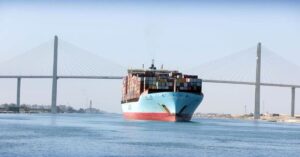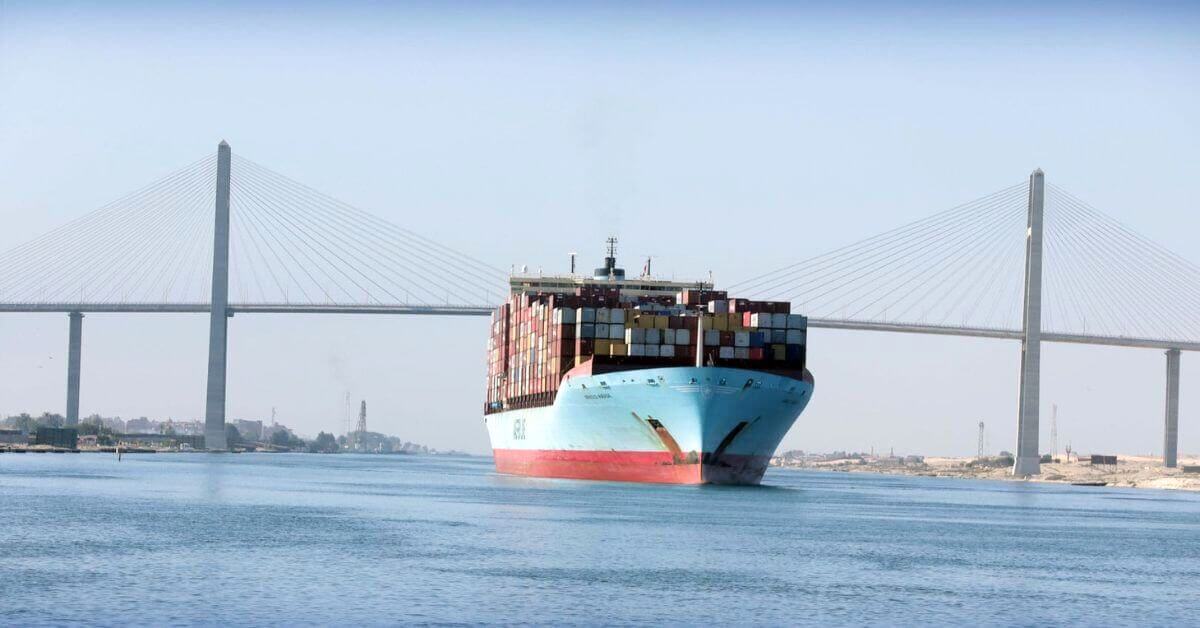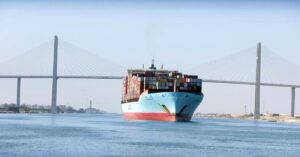
HD Hyundai Secures Largest Container Ship Order In 18 Years Worth USD 1.4 Billion
November 25, 2025
Container Ship Fire Contained After 4 Days At Port Of LA, Salvage Work Progresses
November 26, 2025

The Suez Canal Authority (SCA) and A.P. Moller–Maersk Group have signed a strategic partnership agreement that will see Maersk-affiliated vessels resume transits through the Suez Canal from early December, ahead of a full-capacity return.
The announcement was made through a joint press release after discussions between both sides concluded successfully. CMA CGM is also expected to fully restore its Suez Canal transits next December.
The signing ceremony took place at the New Marina building in Ismailia, attended by Admiral Ossama Rabiee, Chairman and Managing Director of the Suez Canal Authority, and Vincent Clerc, CEO of A.P. Moller–Maersk Group.
Officials described the agreement as an extension of longstanding cooperation and a framework for future maritime and logistical collaboration.
Admiral Rabiee said the return of Maersk vessels marks a move back to the most efficient and secure route linking East and West. He added that the new partnership agreement strengthens long-standing cooperation and opens wider opportunities in maritime and logistics sectors.
The SCA recorded the transit of 1,158 ships in 2023, carrying 127 million tonnes and generating $733 million in revenue.
He also linked the improving shipping situation to regional developments, saying the Peace Summit held in Sharm El-Sheikh had contributed to calming tensions in the Red Sea and Bab el-Mandab region.
The SCA reported positive signs in October, with 1,136 vessels crossing the Canal, carrying 47.1 million tonnes and generating $372.9 million in revenue, higher than the same month last year.
Similar growth was observed in November, which saw 1,156 ships and revenues of $383.4 million, compared to 1,000 ships and $300.6 million last year.
Admiral Rabiee said the Authority will continue discussions with various shipping lines to adjust schedules and encourage the return of traffic through the Red Sea and Bab el-Mandab Strait. He added that talks with CMA CGM had already resulted in a decision for the line to fully resume Suez Canal transits in December.
He pointed out that since the start of the Red Sea crisis, the SCA had expanded communication with shipping lines, strengthened its service network and added new maritime units. He stated that the Authority had also introduced flexible pricing measures, including a 15% toll reduction for container vessels exceeding 130,000 tonnes.
A.P. Moller–Maersk CEO Vincent Clerc expressed appreciation for the SCA’s policies during recent challenges. He said communication between both sides had remained consistent and described the Suez Canal as both an essential global waterway and a strategic partner due to Maersk’s involvement in the East Port Said Container Terminal.
Clerc stated that the Canal continued to be a central route for the group’s shipping operations. He said security developments in the Red Sea over the past two years had led to higher shipping and freight costs worldwide, and that the peace agreement signed in Sharm El-Sheikh and the subsequent improvement in regional stability supported the decision to return.
He added that the strategic partnership agreement represents an important step towards the full-capacity transit of Maersk vessels in the near future and suggested that other shipping lines may also return as conditions normalise. He said the company hoped to see its largest vessels passing through the Canal again and for overall traffic levels to return to their pre-crisis position.
The agreement was signed by Engineer Gamal Abu El-Kheir, Director of the Management Department at the Suez Canal Authority, and Rabab Boulos, Chief Operating Officer and member of the Executive Board at A.P. Moller–Maersk Group.
The ceremony was attended by Admiral Ashraf Atwa, Vice Chairman of the SCA, along with other members of the Authority’s Board of Directors.
Maersk representatives included Ahmed Hassan, Vice President of Operations, and Hany El Nady, the Group’s representative in the Middle East and North Africa.
Reference: suezcanal
Source: Maritime Shipping News


